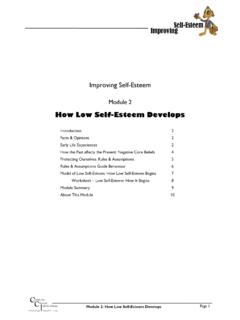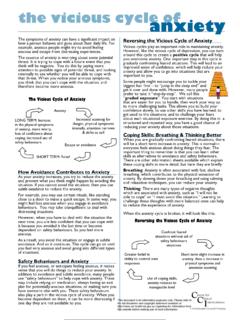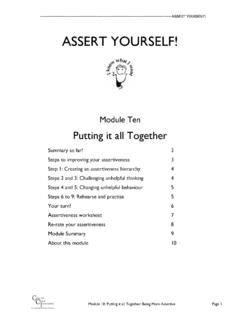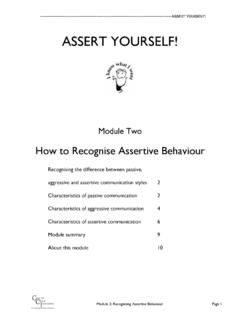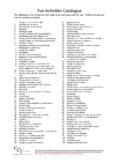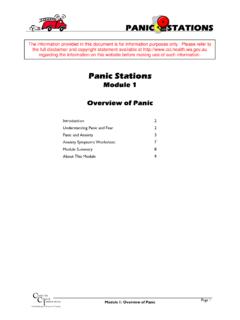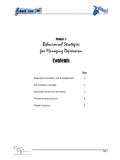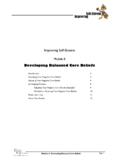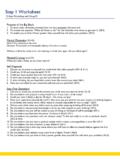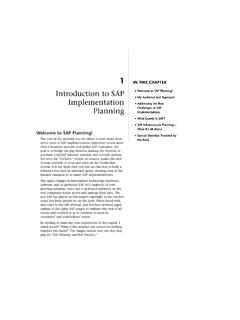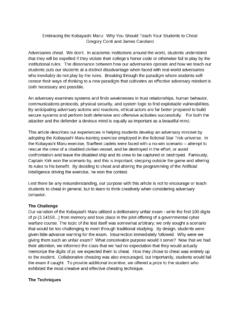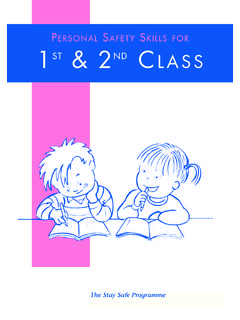Transcription of What? Me Worry!?! - WA Health
1 what ? me worry !?! what ? me worry !?! what ? me worry !?! Module 9. Accepting Uncertainty Introduction 2. Intolerance Of Uncertainty 2. Challenging Intolerance Of Uncertainty 3. Accepting Uncertainty 4. Worksheet: Accepting Uncertainty 5. Module Summary 6. Centrelinical for C Interventions Module 9: Accepting Uncertainty Page 1. Psychotherapy Research Training what ? me worry !?! Introduction As mentioned briefly in earlier modules, the inability to tolerate uncertainty tends to be a unique feature of people who experience generalised anxiety and excessive worrying. This module aims to examine your need for certainty, to look at how this need keeps worrying going, to describe ways of challenging this need, and to discuss how to ultimately accept uncertainty in your life.
2 Intolerance Of Uncertainty The inability to tolerate uncertainty is an attitude many people have towards life. When one has this attitude, uncertainly, unpredictability, and doubt are seen as awful and unbearable experiences that must be avoided at all costs. People who hate uncertainty and need guarantees may: Say things like: I can't cope not knowing, I know the chances of it happening are so small, but it still could happen, I need to be 100% sure.. Prefer that something bad happens right now, rather than go on any longer not knowing what the eventual outcome will be Find it hard to make a decision or put a plan or solution in place, because they first need to know how it will work out.
3 If you have this attitude of being unable to stand uncertainty, then you may perceive worrying to be useful to you. Remember those positive beliefs about worry that we have already covered in Module 6? You may think that worrying is a way of preparing yourself for the worst getting you ready for anything that might happen. Worrying is seen as a way of attempting to predict life so that there are no nasty surprises. As such, worrying reduces your experience of uncertainty and unpredictability. And because worrying reduces your feelings of uncertainty, you will continue worrying and worrying and worrying. In other words, you keep worrying because you believe it is your only strategy for making things in life more certain and more predictable it helps you believe that you have more control.
4 In reality, has your worrying made anything more certain or more predictable? By worrying, does it change the outcome of what will happen? Isn't life still as uncertain and unpredictable as it ever was? It is only your perception that you somehow have more control by worrying. But is this really true? In fact, all you have done is think of all the worst case scenarios and worked yourself up and made yourself feel really bad in the process. So, ask yourself, is it really worth it? Does having a fake' sense of certainty justify all the negative consequences of worrying? If your answer is No', then there are two ways you can tackle your intolerance of uncertainty, which require skills you have developed throughout these modules.
5 You can: Challenge your intolerance of uncertainty and Let go of your intolerance of uncertainty (or Accept uncertainty). By addressing your need for certainty, you are dealing with one of your positive beliefs about worry , which drive you to keep worrying. So by reducing your need for certainty, you will reduce the drive to worry . Centrelinical for C Interventions Module 9: Accepting Uncertainty Page 2. Psychotherapy Research Training what ? me worry !?! Challenging Intolerance Of Uncertainty You should be quite familiar with the challenging process by now. You can use this process to dissect your intolerance of uncertainty and question your need for certainty.
6 Do the exercise below and ask yourself some questions to chip away at your need for certainty. These questions can help you to see that trying to eliminate uncertainty and unpredictability from your life is both impossible and unhelpful. Can you be absolutely certain about everything in life? what are the advantages of requiring certainty in what are the disadvantages of requiring certainty life? How has needing certainty in life been helpful to you? in life? How has needing certainty in life been unhelpful to you or detrimental to your life? Do you tend to predict that something bad will what is the likelihood that the things you predict happen, just because you are uncertain?
7 Is this a will actually happen? If the likelihood tends to be low, reasonable thing to do? Could something good or neutral be could you live with this small chance? just as likely to happen? Are there some uncertainties in your life that you Talk to the people you know. Ask how they cope can live with? How do you do this? Can you do the same with the uncertainty and unpredictability of life? thing in situations where you have difficulty tolerating Could you do the same thing they do in situations where you uncertainty? have difficulty tolerating uncertainty? Centrelinical for C Interventions Module 9: Accepting Uncertainty Page 3. Psychotherapy Research Training what ?
8 me worry !?! Accepting Uncertainty what was your answer to the last two questions in the Challenging Intolerance Of Uncertainty'. worksheet? One question asked about how you tolerate uncertainty in certain areas of your life. The other question asked about how other people tolerate uncertainty in their lives. Chances are you came up with a similar answer to both questions, which might sound something like: There is nothing I can do about it, so I just have to accept it and move on. Letting go of your need for certainty and accepting uncertainty as being an inevitable part of life, can be easier said than done. When demanding certainty and predictability, our attention is very future-focused as our mind worries in an attempt to gain certainty.
9 Therefore, the skills you have developed from your postponement exercises in Module 3, and attention training exercises in Module 4, will be of some assistance when it comes to practicing acceptance of uncertainty. The first step is recognising or acknowledging when you are feeling the need for certainty and wanting to use worry to achieve this. Then making the active choice to not respond to that need, and instead let go and accept uncertainty, by turning your attention to being more present-focused rather than future-focused. Being more present- focused can help bring about an acceptance of uncertainty. If you are focused on the present rather than the future, then uncertainty about the future is less likely to bother you.
10 Obviously, your mind may drift back to wanting certainty and control in life, but just repeat the steps again of being aware, not responding and letting the need for certainty go. Let's look at these steps towards acceptance of uncertainty in more detail. Below is an example, but use the worksheet on page 5 to put in your own words what would help you let go of your need for certainty. EXAMPLE. Be Aware I'm telling myself how terrible or unbearable not knowing is ; I'm seeking reassurance ; I'm getting this agitated and restless feeling that comes with not knowing what will happen ; I'm worrying about things I can't be certain of ; I can't make a decision because I need to be sure of the outcome first.
